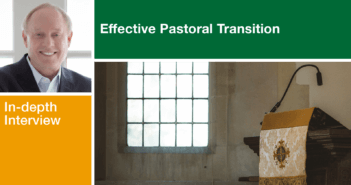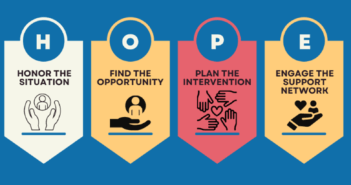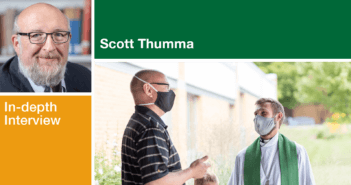
Keep Your Bucket Full of Energy and Compassion
Alan Baker highlights the importance of self-care for pastoral care providers to keep their personal buckets filled so that they are not emptied by burnout…
Subscribe free to "Leading Ideas" at churchleadership.com/leadingideas. Every Wednesday, "Leading Ideas" delivers information, resources, and strategies for forward-thinking church leaders.

Alan Baker highlights the importance of self-care for pastoral care providers to keep their personal buckets filled so that they are not emptied by burnout…

Many pastors recall that it was another pastor who first invited them to consider their call to ministry. Yet it seems fewer and fewer pastors…

How can a seamless pastoral transition lead to a more effective leadership transition? Jessica Anschutz of the Lewis Center staff speaks with Lee Kricher, author…

Podcast Episode 124 How can a seamless pastoral transition lead to a more effective leadership transition? We speak with Lee Kricher, the author of Seamless…

Lee Kricher says that one of the key variables in a successful pastoral transition is humility. It is difficult but essential that both outgoing and…

Lovett H. Weems Jr. writes about the long and rich history of bivocational ministry in the Bible, throughout the generations of American history and around…

How can pastors maximize their effectiveness when it comes to time management? Eric Daniel shares three practices to help pastors work more productively and address…

“Leaders Do Not Take Everything Personally” is presented by Rev. Dr. Camille Cook of Georgetown Presbyterian Church. In celebration of the 20th anniversary of the…

How do church leaders make ministry harder than it needs to be? Carey Nieuwhof identifies five ways that many pressures faced in ministry are more…

“Leadership Includes Self Care” is presented by Pastor Eric Hernandez of Iglesia Metodista de Puerto Rico. In celebration of the 20th anniversary of the Lewis…

How can the church confront its complicity in sexual abuse and misconduct? In this interview, Ruth Everhart, a leading voice on issues of sexual abuse…

Podcast Episode 117 How can the church confront its complicity in sexual abuse and misconduct? Ruth Everhart says churches must restore justice by creating safe…

What separates good preachers from great preachers? Charley Reeb, a Georgia pastor known as a gifted preacher, says talent is less important than approaching the…

Can bivocational ministry be a strategic choice and not just a reluctant concession to financial constraints? Ann Michel of the Lewis Center staff interviews Ben…

Podcast Episode 114 Can bivocational ministry be a strategic choice and not just a reluctant concession to financial constraints? Ben Connelly shares how bivocational ministry…

Lovett H. Weems Jr. reports that the declining number of young elders in the United Methodist Church has accelerated while the number of young deacons…

Tiredness and burnout in church leadership occur primarily because leaders over-function, micromanage, or are placed in roles that do not use their God-given spiritual gifts.…

Ron Edmondson writes that people leave churches for all kinds of reasons, but it’s still hard not to take it personally. He shares five tips…

Sarah Bereza’s new book, Professional Christian, examines the question of what it means to be fully yourself in the spotlight of public ministry. She sets…

Is your cup empty? Jessica Anschutz of the Lewis Center staff writes that many church leaders feel drained by the demands of ministry in these…

Anne Mathews-Younes writes that faith leaders and faith communities are in a unique position to prevent suicide. She shares information about how to recognize the…

Steven Van Ostran challenges the common perception that bivocational ministers are second class or somehow “less than” those serving full time. He names four specific…

How has the pandemic shaped the vitality and resiliency of congregations? Did it really prompt large numbers of pastors to leave ministry? Doug Powe, director…

How has the pandemic shaped the vitality and resiliency of congregations? Did it really prompt large numbers of pastors to leave ministry? Scott Thumma shares insights from ongoing research on the pandemic’s impact congregational life and health.

Tom Berlin says that two years of global pandemic have revealed some key truths about the nature of ministry. Serving in this difficult time has…

What does it take to turn a congregation around? Lewis Center Director Doug Powe interviews Ed Brandt, a long-serving pastor who recently retired as chief…

What does it take to turn a congregation around? Ed Brandt, a long-serving pastor who recently retired as chief of chaplains for the U.S. National Guard, believes success in ministry is grounded in the hard but essential work of reaching out to the community, forging new connections, getting to know people, listening, earning trust, taking risks, and learning from mistakes.

The local church is often the first place people go for help in addressing mental health challenges. Matthew Stanford sees this as a divine opportunity…

What is pastoral imagination? And how can it be nurtured by clergy and laity? Jessica Anschutz of the Lewis Center staff interviews Eileen Campbell-Reed on…

What is pastoral imagination? And how can it be nurtured by clergy and laity? We speak with Eileen Campbell-Reed about how clergy can cultivate and nurture pastoral imagination in order to address conflict, experience joy, and develop a deep, wise knowing.
This article is reprinted by permission from Leading Ideas, a free e-newsletter from the Lewis Center for Church Leadership of Wesley Theological Seminary available at churchleadership.com.